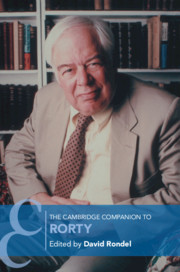Book contents
- The Cambridge Companion to Rorty
- Cambridge Companions to Philosophy
- The Cambridge Companion to Rorty
- Copyright page
- Contents
- Contributors
- Abbreviations of Works by Rorty
- Introduction: The Unity of Richard Rorty’s Philosophy
- 1 Rorty’s Metaphilosophy: A Pluralistic Corridor
- 2 After Metaphysics: Eliminativism and the Protreptic Dilemma
- 3 Rorty and Classical Pragmatism
- 4 A Pragmatism More Ironic Than Pragmatic
- 5 Rorty and Semantic Minimalism
- 6 Returning to the Particular: Morality and the Self after Rorty
- 7 Rorty’s Political Philosophy
- 8 Tinkering with Truth, Tinkering with Difference: Rorty and (Liberal) Feminism
- 9 Rorty’s Insouciant Social Thought
- 10 Rorty and National Pride
- 11 Rorty on Religion
- 12 Rorty: Reading Continental Philosophy
- 13 Rorty’s Literary Culture: Reading, Redemption, and The Heart’s Invisible Furies
- 14 Wild Orchids
- Bibliography
- Index
- Cambridge Companions to Philosophy
9 - Rorty’s Insouciant Social Thought
Published online by Cambridge University Press: 13 April 2021
- The Cambridge Companion to Rorty
- Cambridge Companions to Philosophy
- The Cambridge Companion to Rorty
- Copyright page
- Contents
- Contributors
- Abbreviations of Works by Rorty
- Introduction: The Unity of Richard Rorty’s Philosophy
- 1 Rorty’s Metaphilosophy: A Pluralistic Corridor
- 2 After Metaphysics: Eliminativism and the Protreptic Dilemma
- 3 Rorty and Classical Pragmatism
- 4 A Pragmatism More Ironic Than Pragmatic
- 5 Rorty and Semantic Minimalism
- 6 Returning to the Particular: Morality and the Self after Rorty
- 7 Rorty’s Political Philosophy
- 8 Tinkering with Truth, Tinkering with Difference: Rorty and (Liberal) Feminism
- 9 Rorty’s Insouciant Social Thought
- 10 Rorty and National Pride
- 11 Rorty on Religion
- 12 Rorty: Reading Continental Philosophy
- 13 Rorty’s Literary Culture: Reading, Redemption, and The Heart’s Invisible Furies
- 14 Wild Orchids
- Bibliography
- Index
- Cambridge Companions to Philosophy
Summary
Rorty believed that taking the linguistic turn meant rejecting the idea of “immediate experience,” and he was equally certain that philosophy had nothing of value to offer social and political theory. Those convictions distinguished his version of neopragmatism from those of his contemporaries Hillary Putnam, Ruth Anna Putnam, and Richard J. Bernstein, and from the ideas of his predecessors William James and John Dewey. In his last book, Achieving Our Country, Rorty sought to respond to the critics who challenged his public/private dualism by aligning himself with the Cold War-era labor movement. He remained unwilling, however, to acknowledge the costs of moving from the social democratic “historical Dewey” to his preferred “hypothetical Dewey,” an insouciant proto-Rorty who attributed progressive changes to “lucky accidents” and championed the poetized culture of liberal ironism over the hard work of forging new democratic alliances among a new generation of activists inspired by demands for recognition as well as redistribution.
Keywords
- Type
- Chapter
- Information
- The Cambridge Companion to Rorty , pp. 201 - 221Publisher: Cambridge University PressPrint publication year: 2021
- 1
- Cited by

